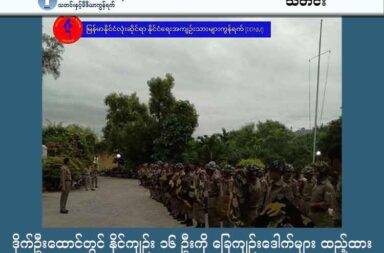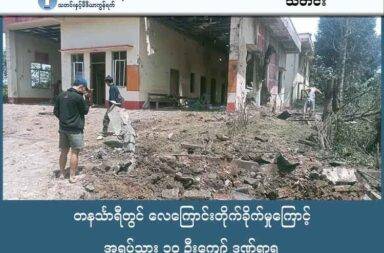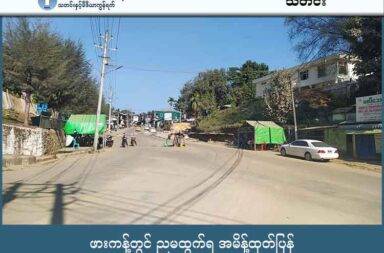Locals Call For Halt to Mong Khok Coal Mining Project
By NETWORK MEDIA GROUP (NMG)
Thursday, October 24, 2019
Locals in Mong Khok, eastern Shan State have demanded that a coal mining project in the area be stopped, citing negative impacts on some 2,000 people and the environment.
According to ethnic Shan environmental organization Shan Sapawa, Mong Khok residents organized a prayer service at Hsai Mong pagoda on Tuesday.
Sai Khur Hseng, a spokesperson for Shan Sapawa, said that if the coal extraction project is implemented, the population of six villages stands to suffer.
“It will impact their livelihoods. Their houses will be damaged. There will be deforestation in the area,” he told NMG. “If the project is implemented, chemical waste will be left in the area. These are toxic substances. Therefore, local people organized a prayer service and called for a halt to this coal extraction project.”
Action for Shan State Rivers released a statement this week saying that more than 2,500 Shan, Lahu and Akha people in Mong Khok stand to be displaced by the effects of coal mining on the area.
Tuesday’s prayer service was to “protect [locals] from danger,” and for coal to be left in its place.
“If coal is extracted, this will destroy our farmland and the water in the river,” the network wrote in the statement, quoting a local opposed to the project.
The statement reported that the Burma Army has built three military camps in the Mong Kok area, likely for the purpose of providing security surrounding the coalmining venture.
Sahakol Equipment, a Thai mining contractor, and Golden Lake Co. Ltd. of Burma, signed a memorandum of understanding on July 11, 2019 to run the mine together. According to the contract, the project will last 28 years. Investment companies stand to make 27 billion baht (more than US$890 million) in profits.
Shan Sapawa’s Sai Khur Hseng pointed out that other countries are moving away from coal as an energy source, due to the high levels of pollution associated with it.
“Many nations are using alternative technology for energy and are closing coal-powered plants. Yet our country is preparing to extract coal to sell,” he said. “It’s not good for the future of our country, especially for our new generation. If we leave these problems for our next generation, our country will not be great.”
He highlighted how the process of coal extraction leaves toxic chemicals in the area, creating problems for locals well into the future.
“From a health perspective, it’s too dangerous. We want this project to be stopped,” Sai Khur Hseng told NMG.
Sahakol Equipment and Golden Lake Co. Ltd. have jointly invested 300 million baht (nearly US$10 million) into the mining venture, with Sahakol owning 70 percent of the project, and Golden Lake taking a 30 percent share.
Action for Shan State Rivers has said that the companies plan to extract 300,000 tons of coal per year. Most of the coal will be exported to Thailand. There is also a plan to build a coal-powered electricity plant capable of producing 600 megawatts of power. This electricity would also be exported to Thailand.
The Italian-Thai Development company originally received permission to extract lignite from the Mong Khok mining site in 2008, but the project was halted in 2011 after people in both Thailand and in Shan State voiced strong opposition to the initiative.


